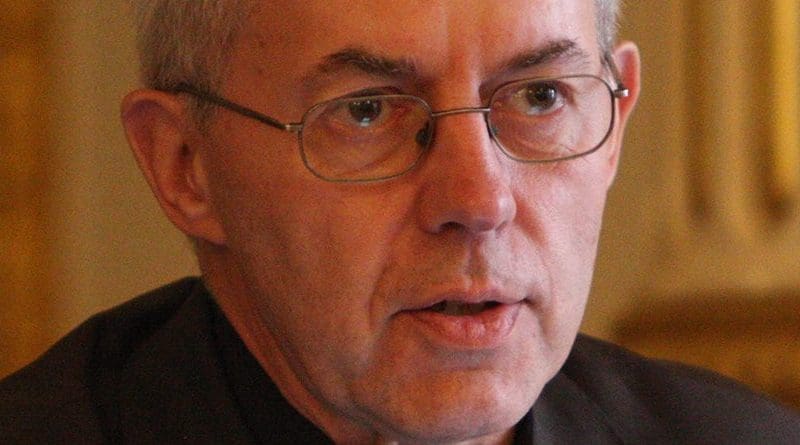Political Engagement A Minefield For Religious Believers – OpEd
By Arab News
By Peter Welby*
The quirks of the UK political system mean that the only politicians in the country who get criticized for contributing more, rather than less, are bishops from the Church of England (of whom there are 26 in parliament).
The game goes something like this. Bishop: “In Matthew’s gospel, Jesus calls for us to feed the hungry, house the stranger, clothe the naked, care for the sick, and visit those in prison.” Outraged observer: “I would advise the Right Reverend Prelate to spend more time caring for the spiritual wellbeing of his flock, and leave politics alone.”
The UK’s strange porridge of a constitution makes the question of the involvement of religious leaders in political matters a perennial one. The Church of England used to be regarded as “the Tory party at prayer.” It is probably, like the country itself, more left-wing on economic matters these days, although most of the bishops in parliament (who by convention do not vote in elections) would argue, fairly, that they do not have a partisan affiliation. That didn’t stop critics accusing them of political bias in a pastoral letter issued by the bishops ahead of a general election in 2015.
Nevertheless, the issue is not unique to my country. Christian leadership in the US is (very roughly) divided into Republican-supporting evangelical Protestants and conservative Catholics; and Democrat-supporting liberal Protestants and Catholics. In many countries of continental Europe, church leadership has long been identified with the forces of reaction (in the French Revolution, this led to the almost total despoliation of the Catholic Church in France).
Nor is it unique to Christianity. In a corner of East London in 2015, a local mayor was convicted of electoral fraud, including the use of “undue spiritual influence” — threatening spiritual consequences for certain actions — to persuade Muslim voters to vote for him.
And yet there is a new trend at work in religious politics; one driven by religious “activists” against religious leaders. This trend combines political immaturity, ideological purity and utopian idealism to establish a bar that no responsible individual in public life, including religious leaders, could hope to meet.
I use the term “religious activism” carefully, because these people are not activists for their religion (such as one might call evangelists) or for the application of moral teachings in public life (such as drove William Wilberforce and many other great figures over the centuries). They are usually a form of political activist, using religious language to cover their politics.
As a Conservative-voting Christian, there have been aspects of government policy in the UK over the past eight years that have made me profoundly uncomfortable. But voting is a complicated process, in which one is required to weigh up the pros and cons, philosophical and practical, of a particular electoral outcome (most of us achieve this largely subconsciously). Since I have been old enough to vote, that process has led me to cast my ballot for a single party. The same process for other Christians of my acquaintance (including some in my family) has led to votes for different parties.
And yet there is a vocal group among Christian “religious activists” in the UK who suggest that voting Conservative, or voting for Brexit, is not possible for true Christians. They suggest that some of the “cons” in the electoral weighing up of benefit and harm are absolute. That to support a party that allows, or even pursues, such harms means you cannot be a true Christian.
Political immaturity is demonstrated by a harsher application of tests to the party one opposes than to the party one supports; ideological purity by the rejection of the idea that someone who comes to an opposing conclusion may have good reasons in good faith; and utopian idealism by the rejection of the idea that politics requires compromise between benefits and harms.
This is daft but entirely in keeping with the “religious activist” approach. They believe that one can change the world for the better with protests in social and conventional media and through public protest, without actual engagement with the dirty business of international politics (political immaturity); that those who do not publicly condemn countries and leaders for certain actions must support those actions (ideological purity); and that certain actions render a country’s leadership entirely evil, whatever else it does (utopian idealism).
It is important to stress that certain actions do put individuals, parties and governments beyond the pale. But such a judgement, as in almost all else in life, is arrived at from a weighing up of benefits and harms. In the New Testament of the Bible, it says that “all have sinned and fall short of the glory of God.” Mature political engagement for religious believers, on the domestic and international scene, requires us to recognize this fact and work with the world as it is, not as we would like it to be.
- Peter Welby is a consultant on religion and global affairs, specializing in the Arab world. Previously, he was the managing editor of a think tank on religious extremism, the Center on Religion & Geopolitics, and worked in public affairs in the Gulf. He is based in London, and has lived in Egypt and Yemen. Twitter: @pdcwelby

